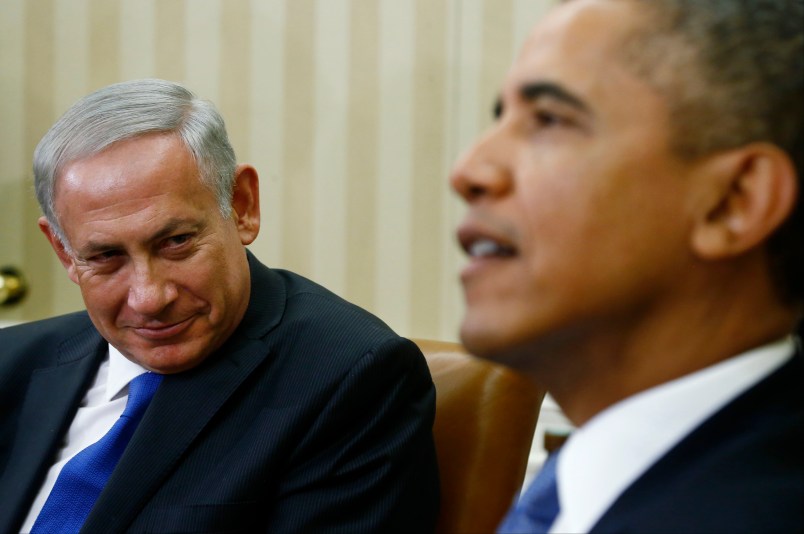As is so often the case, JJ Goldberg of The Forward provides clarifying correctives to the Oren oped and the storm it’s generated. First he mentions something that occurred to me as well. The Journal subtly but dramatically changed the meaning of Oren’s attack with its headline. Oren said Obama “abandon[ed] the two core principles of Israel’s alliance with America.” The Journal glosses that as “How Obama Abandoned Israel.” Big difference.
But what are these two principles Oren claims Obama abandoned? The so-called policy of “no daylight” – no public disagreements between Israel and the US on core security issues and “no surprises”, which is what it sounds like, both sides brief the other side before taking actions. Don’t catch the other party off guard.
Oren suggests that these are longstanding principles undergirding the alliance. But as Goldberg notes, that’s nonsense. In fact, you can’t really believe this if you have any really strong acquaintance with the history of the US-Israel alliance. And Oren is extremely well acquainted with it. He is an historian of some note. If you’re ever interested, he wrote a really good history of the 1967 War. Goldberg goes through a litany of cases over the last half century where the US publicly disagreed with Israel or announced a policy without first getting Jerusalem’s sign off. The examples are so numerous that really, what on earth is Oren talking about?
It is unmistakable that there has been an effort on the part of some in Israel and some on the right in the US to create these ‘principles’ and the manufactured history behind them and to employ it as an invidious metric against which President Obama and future US presidents are to be judged. But the history is simply false.
Does no one remember how the Lebanon War ended or the Reagan administration peace plan? Or for that matter, does no one remember the epic blow up with the first Bush administration over loan guarantees for the settlement of post-Soviet Russian immigrants to Israel or James Baker’s strong-arming the Israelis to the Madrid peace conference?
Closer to the truth is that Obama did change the nature of the relationship as it had existed under George W. Bush, which is hardly surprising. And it also changed, in a way, from what it had been during much of the Clinton administration. But the details are key: this was the case during those periods where Clinton was working with Labor Prime Ministers (Rabin, Peres and Barak) with whom he was working in broad policy agreement. It was quite a different story from 1996 to 1999 when Netanyahu was in office with President Clinton, another US president he despised. (Clinton entirely returned the favor.)
And this gets us to the biggest problem with Oren’s thumbnail history of US-Israel relations during the Obama-Netanyahu era. To me, the biggest provocations clearly come from the Netanyahu side. But I’m hardly a disinterested observer of the evolving drama. The bigger truth is that a collision between these two men was inevitable because they both came into office wanting to overturn the policies of their predecessors and that placed them on a collision course that was simply not possible to finesse.
Here’s how Goldberg captures it …
This is Oren’s biggest error. In fact Obama and Netanyahu were doomed to collide from the outset. Both entered office determined to correct what each saw as his predecessor’s disastrous missteps. They were on a collision course.
Obama was intent on repairing America’s relationships with the Muslim world, which he believed had been ruined by the Bush administration’s clumsy war on terror and its dramatic tilt toward Israel. Repair required outreach to Muslims. It was bound to unsettle Israelis. Obama assumed, naively, that he had enough credit as president of the United States to glide past the slight without a blowup. He also believed Israel was able and eager to join the outreach by closing a deal with the Palestinians. He was wrong.
Netanyahu entered office intent on rolling back two decades of what he considered dangerous Israeli concessions to the Palestinians, from Rabin to Ehud Olmert. Rollback would have required toughness in facing any American administration, given the consistent arc of U.S. policy. Facing a Democrat intent on reaching out to the Muslim world, it guaranteed prolonged tension.
Compounding the tension was the fact that the concessions Netanyahu aimed to roll back had, as Obama and much of the West saw it, brought Israel and the Palestinians to the very brink of a peace agreement. Given the symbolic role of the Palestinian conflict as a continuing irritant in the West’s relations with Islam, rollback meant a tragically lost opportunity, and not just for Israel.
This captures the essential truth of the situation. My only small quibble would be to say that you can almost put it more simply. Obama came into office wanting to make the ‘peace process’ into a peace reality, or to put it more prosaically, to move from the policy of permanent negotiation to a final territorial settlement. Netanyahu came to office wanting to end the ‘peace process’, or more prosaically, believing that a generation of Israeli leaders from Labor, Likud and Kadima had made a series of unmerited and unreciprocated concessions to the Palestinians which he meant to rollback. For good.
A basic and sustained confrontation was truly inevitable.







